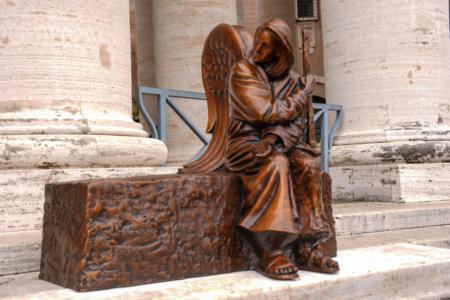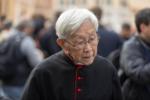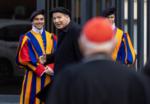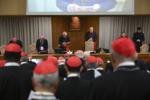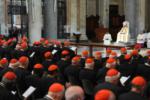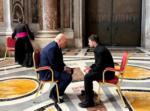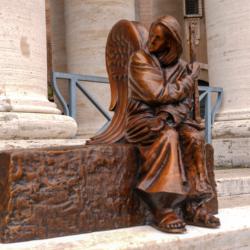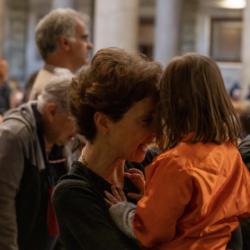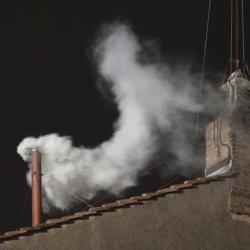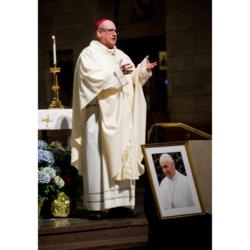NCEA convention opens in Boston
Catholic educators must not only teach their students about God, but must witness to them how to live a Christian life by putting their faith into practice, said Archbishop Seán P. O’Malley, keynote speaker at the opening session of the annual National Catholic Educational Association (NCEA) convention April 13. Approximately 14,000 people are expected to attend the convention held at the Hynes Convention Center April 13 through April 16.
The archbishop welcomed convention attendees to Boston for the 101st NCEA convention, entitled “Heritage and Hope: Faithful Past, Faith-Filled Future.” He thanked educators for their dedication to educating young people, telling them that their services are “contributing to a better world.”
He encouraged them to focus their efforts not only on teaching academic subjects but also on teaching morality.
“As educators, we must see our role as trying to prepare people to be good and virtuous,” the archbishop said. “Catholic education has always been about that quest — to form the whole person — to help people know about God’s plan for the world and to be a part of that plan.’’
“Our task is not just to teach people about God but to help them to know God and His love,” Archbishop O’Malley continued. Teaching students about their Catholic faith must be a process of mentoring, he said, where the Word of God is “not expected to be received as mere information,” but as having a “deeper meaning” for their lives.
Young people today are growing up in a secular world where violence has become entertainment, marriage is threatened and the sanctity of life is disregarded, he said. The Gospel messages that Catholic educators must teach are becoming “increasingly alien” to the views held by the majority of society, the archbishop stated.
An obstacle to truly transmitting the faith to schoolchildren is the lack of faithful witness by many of their parents and adult role models, said the archbishop. “A huge area where we are most deficient and which hampers our attempts to teach the young is that of adult faith formation,” he explained.
He declared that the Church should look to the apostolic movements, which have arisen after the Second Vatican Council, and have had “great success in communicating a deep spirituality to their members in the context of small, close-knit communities.” These movements “energize their people to be evangelizers,” who bring the good news they have received to those around them, he said.
“Catholic education is about making disciples, helping people respond to the call of holiness by being part of a faith-filled worshipping community struggling to be faithful to the Gospel,” Archbishop O’Malley told attendees.
Catholic educators and other influential adults in the lives of young people need to be models of Christian living, he said. Students will not learn how to be faithful unless they see examples of faith in their own lives and through the lives of the saints, the archbishop continued.
“We need to equip our young people to be disciples. They need to know the truths of our faith, but they need to know how to live those truths,” Archbishop O’Malley declared. “Young Christians need mentors” and will learn to live their faith by emulating their elders and the saints of the Church, he reiterated.
Convention attendees were also welcomed to the city by Boston mayor Thomas M. Menino, who attended Catholic schools for 12 years.
“My Catholic education gave me the foundation of who I am today,” he said. “That Catholic education made me a better son to my parents, a better husband, a better father, a trusted leader and most importantly a devoted Catholic.”
To ensure that generations to come have the same benefits of Catholic education, the NCEA drafted a mission statement in January. The mission statement was written in order to “strengthen the gift” of Catholic education, said NCEA president Michael J. Guerra.
Those in attendance verbally affirmed the language of the NCEA mission statement.
‘‘The vision statement that we will promulgate today is a landmark that will define us for a century to come,” Guerra told attendees. “Catholic schools carry out a great mission,” they are “a great service to these children and their parents and our country.”
Approximately 54,000 students in the Archdiocese of Boston alone benefit from Catholic schooling.
Archdiocesan superintendent of schools Sister Kathleen Carr, CSJ, welcomed the crowd and called the convention a “time of new beginnings.”
“With gifts of our heritage and hope in hand, we are invited to take the opportunity of the fresh possibilities ahead,” she said quoting from the title of the convention. “Seeing this large gathering of Catholic educators is a great inspiration for each of us.”
As models of dedication to Catholic education, two individuals were honored during the opening ceremony.
Peter S. Lynch, Boston resident and chairman of the Inner-City Scholarship Fund, which awards Catholic school scholarships to inner-city students, received the Catherine T. McNamee Award for his dedication to needy students. Sister Joan Curtin, CND, director of the catechetical office in the Archdiocese of New York, was awarded the C. Albert Koob Award for her contribution to Catholic education.
Thousands filled the main auditorium to take part in the opening session of the four-day convention. It began with a celebration of the history and diversity of Catholic education and a look forward to the next 100 years of instructing young people.
Musicians led a procession playing Revolutionary War tunes on drums and flutes. Local Catholic school students and staff, carrying over a dozen flags representing the many different countries that students in the Archdiocese of Boston come from followed.
